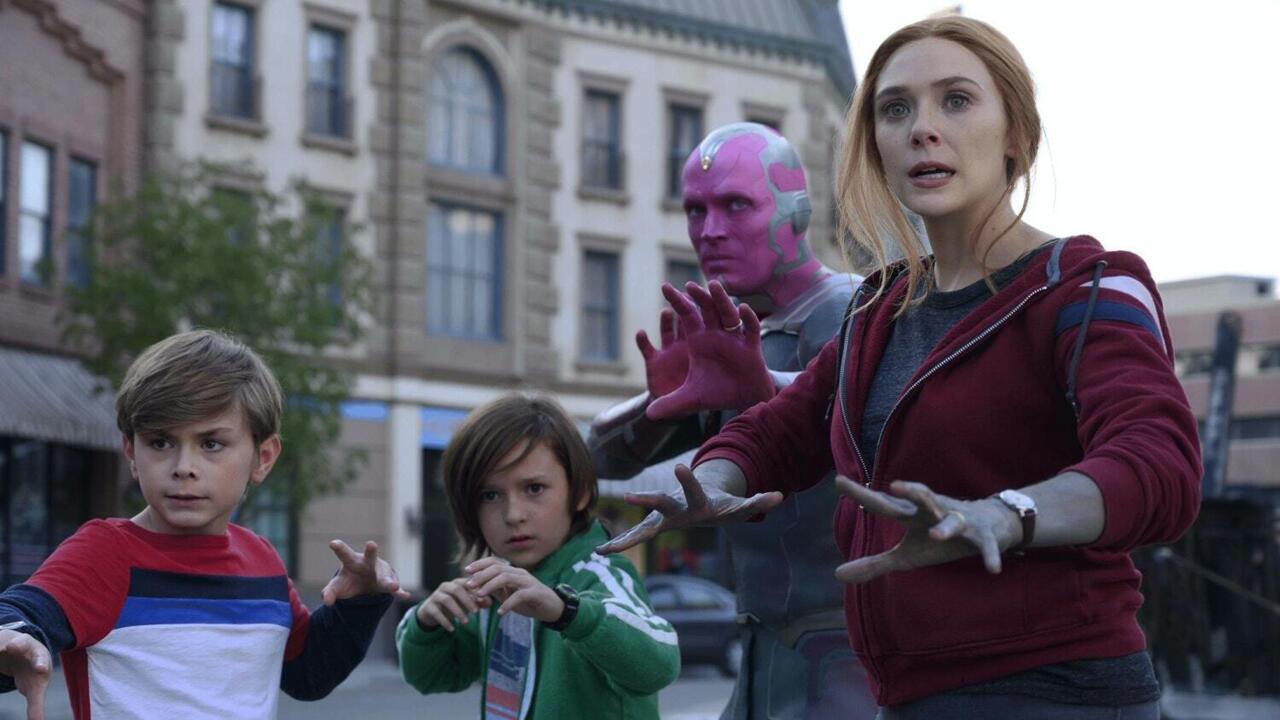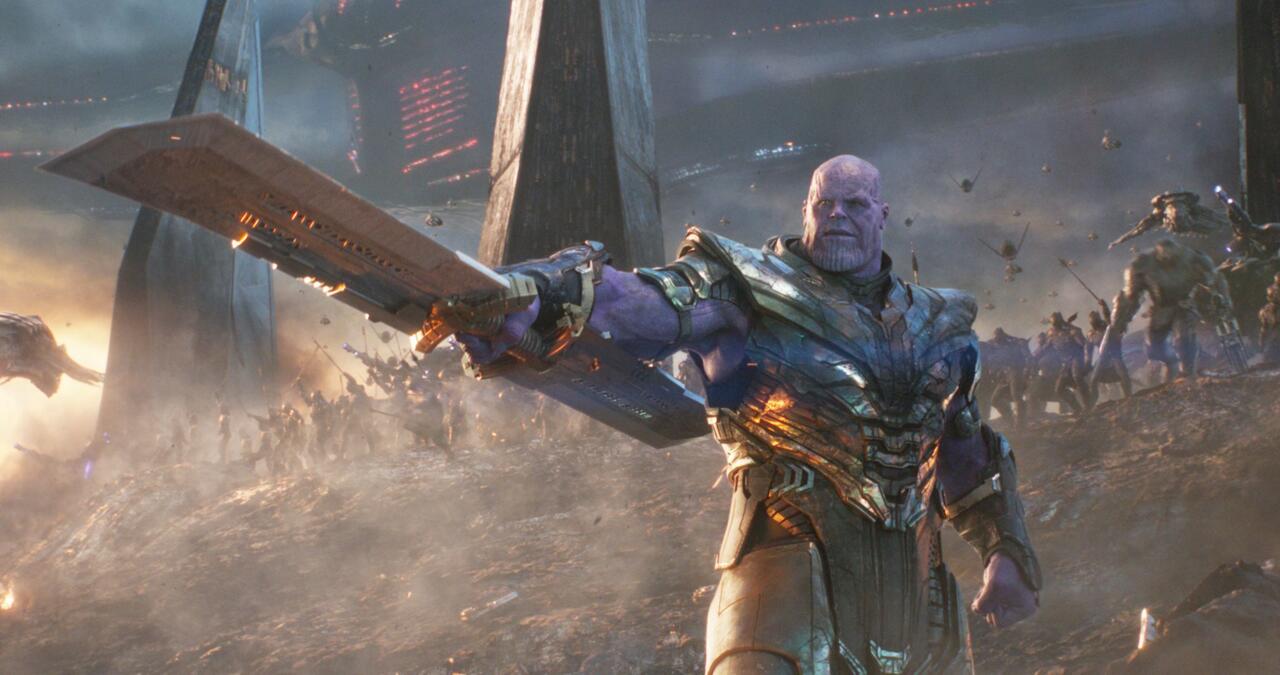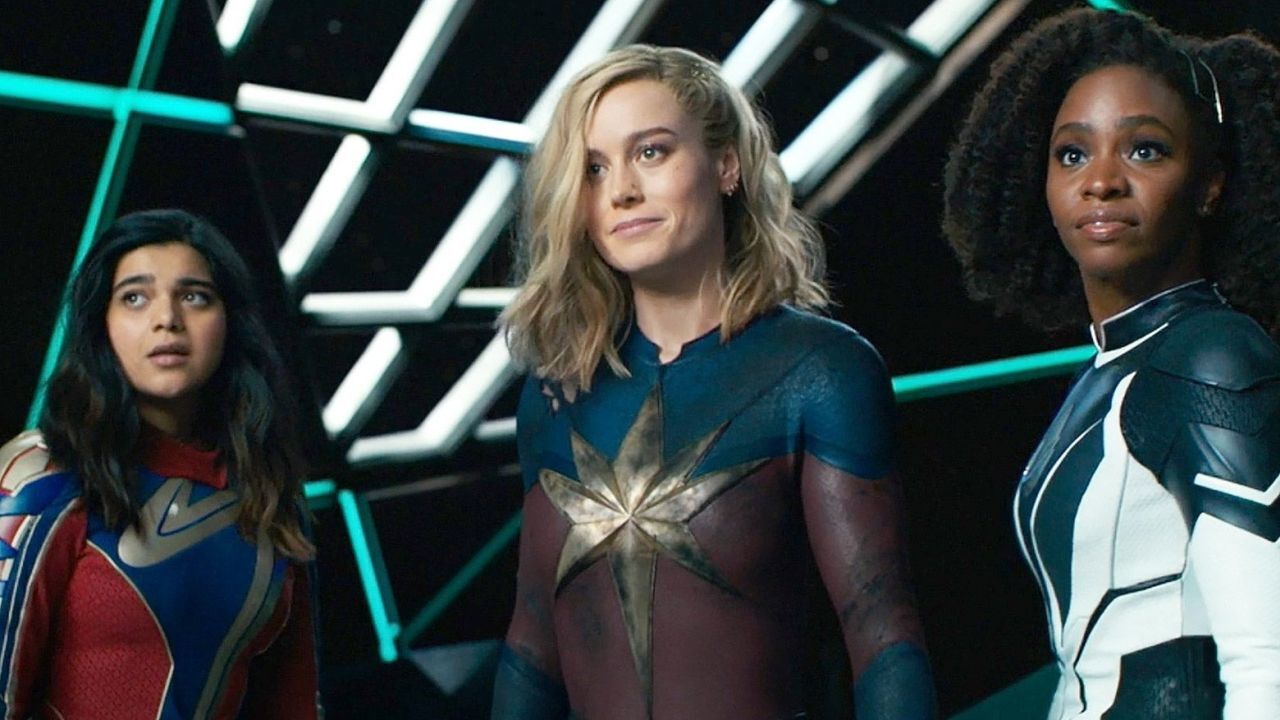The Marvel Cinematic Universe's Downward Spiral Kicked Into High Gear In 2023
After an unprecedented run of successes, Marvel has been stuck in one long stumble.
It's official: The Marvels is the worst-performing MCU movie ever, making even less than Black Adam, DC's similarly poor performer from last fall. Over the last decade and a half, Marvel has proven to be hugely popular, with its biggest movies among the highest earning films of all time. Meanwhile, The Marvels star Brie Larson is a massively popular actor reprising a role from the MCU's Infinity Saga. Yet, this is where we are. So what's going on?
People throw around the term "superhero fatigue" as a reason to dismiss poorly performing comic book movies or TV shows. It's more complicated than that, though. In reality, a combination of factors are at play, including a misunderstanding of why people were so invested in the first arc of MCU movies, things Marvel Studios should've been doing to get viewers ready for the future of the franchise, and a wild miscommunication between the studio and its fans about what matters in these movies and shows.
People didn't actually like comic book movies

I love superhero movies. You might love superhero movies. But for many people, the MCU ended with Avengers Endgame--the movie that literally had Endgame in its title. For them, it wasn't about liking superhero movies or even Marvel movies specifically. Rather, many of us got swept up in our love for Steve Rogers and Tony Stark (and a few others, of course). Endgame gave finality to two of its most popular characters, and in the process gave many fans of those earlier Marvel movies an excuse not to come back. Cap, Tony, and Black Widow were all irrevocably gone, and characters like Hulk and Hawkeye were in a confusing state of limbo.
That some Marvel characters were going to step away after Endgame was a foregone conclusion and Marvel Studios knew it was going to happen well in advance. However, while preparing for the next arc, the studio didn't do the work to endear us to other characters that we could carry on with. Captain Marvel, Doctor Strange, Spider-Man, and Ant-Man are the closest things audiences currently have to Cap and Tony, but none of them have won over the hearts and minds of viewers in the same way. Captain Marvel is arguably one of the leaders of the MCU right now, but the Russos downplayed her presence in Avengers: Endgame because they couldn't (or didn't want to) deal with her nuclear powerset, missing a chance to give us a reason to care about the character in any meaningful way.
The characters that did carry over from the earlier age of the MCU, meanwhile, have had fewer movies and/or TV shows come out more slowly due to the growing cast of the MCU. Even Hulk was more or less a part-time sidekick in She-Hulk.
The COVID of it all

2019 saw the three-punch combo of Captain Marvel, Avengers: Endgame, and Spider-Man: Far from Home all hit within five months of each other.
Then the forward momentum just stopped. Right after the end of one of the biggest storylines in pop culture, COVID hit hard and we wouldn't see another Marvel movie for two years. That's not just two years of movies in development, but also two years of planning for what to do after Endgame was also put on pause because none of the other parts of the Marvel Studios machine could really move, and it was up to the then-new Disney+ service to fill in the gaps with Marvel shows like WandaVision and Loki.
It really can't be understated how many wrenches COVID threw into the spinning gears of Marvel's machine. WandaVision was supposed to hit Disney+ just a few months before Doctor Strange in the Multiverse of Madness, rather than a year and a half earlier. Doctor Strange's second outing was also supposed to land before Spider-Man: No Way Home to kick off the multiverse for real, but delays, complications, and the fact that Spider-Man's cinematic likeness is ultimately owned by Sony all messed up the schedule there.
There's No Team In "I"

In the earlier days of the MCU, it was easier to keep things straight. We had just a few characters with their own series in Cap, Iron Man, and Thor. With the exception of Iron Man (he had two), each member of that trio got one film before Avengers. Characters were introduced and new movies were released at a pretty reasonable cadence at that point, to the tune of 2-3 movies a year. Every two years or so, we'd get a team-up movie.
When we look at the post-Endgame MCU, though, we've had 11 films since the last team-up, including two Spider-Man movies and Black Widow, a long-overdue make-up film that told a story about a character whose ending we already knew--even Ms. Marvel herself, Iman Vellani, has voiced her feeling that it's been too long since Marvel Studios had a big team-up feature. Black Widow was essentially Marvel fulfilling a contract with Scarlett Johansson, and it was ultimately damaging to the MCU if only because it was comparatively boring and because it released in 2021 when worries about COVID were still everpresent. This isn't to say that Black Widow didn't deserve her own movie, but that Marvel Studios probably should've released it before, you know, she fell to her death on an alien planet.
We also had Eternals in there. Director Chloe Zhao presented us with some startling, exciting visuals, and the movie had its own merits. However, it largely didn't feel like a Marvel movie compared to previous outings. We were introduced to something like 10 brand-new characters that were supposedly around for Thanos' attack on existence itself, but were meant to believe that they had good reasons for not helping out. Avengers took five movies to introduce us to five characters, but this movie introduced us to all of these characters at once, and none of them had the charisma that helped us hook into the previous characters.
As for more familiar characters, the latest entries from Thor, Ant-Man, and Doctor Strange are all considered among the lowest points of the MCU in terms of quality. Then there's The Marvels, which is by all accounts a pretty good MCU film. Yet, still, it has the distinction of being the lowest-grossing Marvel tale yet. So in addition to the flood of new characters populating the universe, even the movies about the faces we're familiar with aren't exactly getting the job done.
This is the longest time between team-up movies in the MCU by a pretty wide stretch, and we're set to get another five movies before the next Avengers film. Before, we had The Avengers, a team of specific heroes. After 16 movies that will include four teams--Eternals, Marvels, Fantastic Four, and Thunderbolts, all of which introduce new characters--we'll finally get an Avengers movie. What's more, The Marvels even teased the possibility of yet another team, which could make things even more confusing.
Part of the problem here is that Endgame marked the end of the Avengers as we knew it, and there seemingly wasn't a plan for what the next team would look like at the time. The X-Men only rejoined Disney in 2019, and there were already years of films in production by that point. It's only in the last year that we've started to see hints and Easter eggs about Marvel's mutant team.
So instead of having a clear team to cheer for, what we have is a bunch of guys. Just guys everywhere. Little guys, big guys, flying guys, multidimensional guys.
Being a superhero is hard. Watching superhero movies shouldn't be.

And that gets us to the problem that people are more or less aware of: Marvel movies have become homework. This is the same problem that began to drag on the CW's Arrowverse shows. The Marvel TV machine has spun up, and the Marvel movie machine is back up to speed. Not only have there been 11 films, but also 10 shows comprising 69 episodes and something like 51 hours of television.
Some of these series, like WandaVision and Ms. Marvel, have dovetailed into movies in some way. Others, like Moon Knight and Secret Invasion, happen entirely in the periphery. Moon Knight, for the fun show that it was, was more about Oscar Isaac's acting chops of playing a bunch of different weirdos, rather than connecting his character to a greater universe of characters. And Secret Invasion, which was released before The Marvels, certainly seems to be set after it. Otherwise, how was it not brought up even once?
Part of the allure of these movies was seeing our cool friends in weird costumes pop up, but now we have more places to look for them, and we're not even seeing them. Shang-Chi, Doctor Strange 2's America Chavez, Namor and, again, Moon Knight--each a compelling character on their own--haven't been seen anywhere else. Kit Harrington's Black Knight could've popped up in London at the same time as Moon Knight. Shang-Chi could've appeared in She-Hulk: Attorney-at-Law--the lack of MCU characters appearing in that show was just one of its failings. Members of the Eternals could've cropped up elsewhere--though again, despite some great casting, none of those actors has enough going on to make bringing them back interesting.
It's hard to tell which Marvel shows are 'required reading,' and there are a lot of Marvel shows. There's no red asterisk at the upper-right corner of the title to remind you that this show will matter to the greater Marvel story, and if skipping it will leave them confused or not, and people aren't willing to do work to figure that out.
The power of the supervillain

Along with a clear team of recurring heroes to work with in the earlier days of the MCU, we had a great villain. Thanos acted as this specter for a bunch of movies and began to appear more and more until he had his moment as, essentially, the main character of Avengers: Infinity War.
The next storyline is supposed to be the Multiverse Saga, featuring Kang the Conqueror as the main threat. Let's set aside the fact that 'Kang the Conqueror' just sounds less intimidating and more obviously like he hails from the Silver Age of comics in which he originated when compared to Thanos. Following Majors being found guilty of assault and harrassment, Marvel Studios has now dropped him--the actor who was to shoulder this entire phase of Marvel movies--completely.
Marvel could absolutely recast Kang, and it could even make sense for the character. By his very nature, Kang isn't just one character--he's inherently lots and lots of characters. Variants of Kang have appeared in Loki Seasons 1 and 2, as well as Ant-Man and the Wasp: Quantumania. While they're all played by the same actor, though, they've been different characters. Victor Timely, He Who Remains, and Kang were all very different characters, and only Ant-Man's Kang actually used the name. Marvel Studios has failed thus far to make them feel connected to the greater audience.
At the same time, Studios has a mixed history when it comes to recasting characters. Mark Ruffalo replaced Edward Norton as Bruce Banner, and Don Cheadle replaced Terrence Howard as James 'Rhodey' Rhodes due to disputes between the studio and actors, and they chose to recast Thaddeus 'Thunderbolt' Ross following the death of William Hurt, with Harrison Ford playing the character for at least one appearance in the fourth Captain America film. However, Marvel Studios also decided not to recast T'Challa in Black Panther: Wakanda Forever following Chadwick Boseman's death. Kang was set to have a massively prominent role in the MCU; of the aforementioned characters, only Black Panther compares to Kang in terms of role prominence and billing. It's difficult at this point to say whether Marvel will actually move ahead with recasting the character.
On top of Marvel's struggles with making this character meaningful to the audience and with finding an actor who can play the role, multiverses are an inherently slippery concept, and Marvel is struggling--just like Loki in the Loki Season 2, ironically--to keep all of the different threads straight.
All of these disparate movies and characters have broken down the once straightforward continuity of the MCU. It was easy to tell who was who, when, and where. So we've had an explosion in casting, and a scattering in time and space. It's a long way from all the Super Friends living at the Avengers campus.
An industry in flux

Another exacerbating factor in this is the presence of Disney+ itself as a reliable streaming source for Marvel content. The pandemic certainly inflated the importance of the service for Disney, as it was a stopgap solution to keep investors from getting antsy if the company's profits were somehow down during a time when the whole world was in their homes. In the process, though, it chipped away at the "event" status of Marvel Studios movies. Not only were we getting much more frequent doses of Marvel thanks to the constant stream of Marvel shows, but we knew the movies would end up there in short order. Marvel movies stopped being a theatrical event to being something you could just catch on streaming later, maybe, when you had time, if you remembered. And then Disney, like Netflix and Max, began to ramp up their prices from feeling reasonable to being a burden, so now people are canceling their services and not actually watching those eventually-maybe movies at all.
Also affecting overall sentiment is the state of VFX in Hollywood. As Marvel put out too many shows and too many films too quickly, all of these productions, which were happening at the same time as whatever else was going on in Hollywood at the time, reached a critical mass. Despite being a house built entirely on great VFX, Marvel never saw a need to build its own in-house VFX team, instead seeing fit to continue contracting out to these overworked VFX studios that were bidding lower and lower to get their business. Moviegoers have complained more about Marvel VFX in the last couple of years than in the decade before that--people are noticing.
All of these things have devalued Marvel movies in the eyes of fans. They're a dime a dozen, they don't look as good as they used to, they're confusing and feel scattered. They've gone from the biggest story in the world to a smattering of somewhat-connected threads that often don't end up getting tied off. It looks less like a line and more like It's Always Sunny in Philadelphia's Charlie Kelly's conspiracy board for Pepe Silvia. Even those of us who are still fans, who are still going to these movies on day one and watching the shows concurrently, can't keep it all straight.
The Marvels

Let's talk about Captain Marvel and The Marvels specifically for a moment. Let's set aside the conflict between Brie Larson's sheer existence and the entire industry of YouTubers who have built empires on screaming about her. Marvel set her first movie in the 1990s, and then her next appearance was in Avengers: Endgame, where, again, the Russos seemingly only featured her as much as they were forced to, which wasn't much. Her best buddy in the MCU has consistently been Nick Fury, and our latest adventure with him was Secret Invasion, a snooze of a TV show that mostly just reminded us that Samuel L. Jackson is a 74-year-old man, and featured hide nor hair of Captain Marvel, the person who had helped establish the relationship with between Earth and the Skrull refugees. Monica Rambeau was an important character in WandaVision, but we haven't really seen her since then, and so when she appeared in this movie, plenty of people had forgotten about her. Oh yeah, and it also brought Iman Vellani's Kamala Khan into the fold, following her Ms. Marvel show on Disney+.
Say what you will about the quality of the movie, which we enjoyed. Only the most committed fans of Marvel movies can remember and track all of these characters and timelines. It's hauntingly similar to the collapse of comic books in the 1990s, when readership fell off hard and publishers were left only with dedicated fans who dutifully bought their books every single week.
I loved Marvels. I'm excited about so many upcoming Marvel projects like Blade, Deadpool 3, and whatever they end up doing with the X-Men. It's even fun to think about how Kevin Feige can redeem the Fantastic Four after exclusively bad movie adaptations. But it's harder than ever to blame people who have fallen off, as Marvel made missteps and turned their fandom into fan labor.
Got a news tip or want to contact us directly? Email news@gamespot.com
Join the conversation